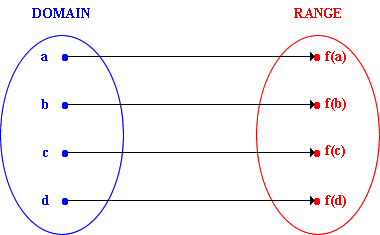|
A Set is a primitive notion. We start with set (or another word for
it: collection) as a basic notion,
An Ordered Countable Set is also called a sequence.
If it has two elements it is called an ordered pair.
A function is a collection of ordered pairs whose first elements are
all different.
The first elements are called arguments the second values.
The set of arguments is called its domain.
The set of values is called its range.
We describe each pair in the function f by f(argument) = value.

It is perfectly OK for f to have the same value for two different arguments:
say for f(d) and f(e) to be identical. We can describe a function by listing its
pairs, or by drawing a graph of representative pairs: in the usual way: if f(a)
= b put a point at the intersection of the vertical line through a on the
x axis and the horizontal line through b on the y axis.
However we cannot list all the pairs in functions having infinite domains.
Instead we define such a function by giving a procedure you can use to construct
its value for any argument you choose in its domain. This procedure is often called
a "formula" for the function.
|

